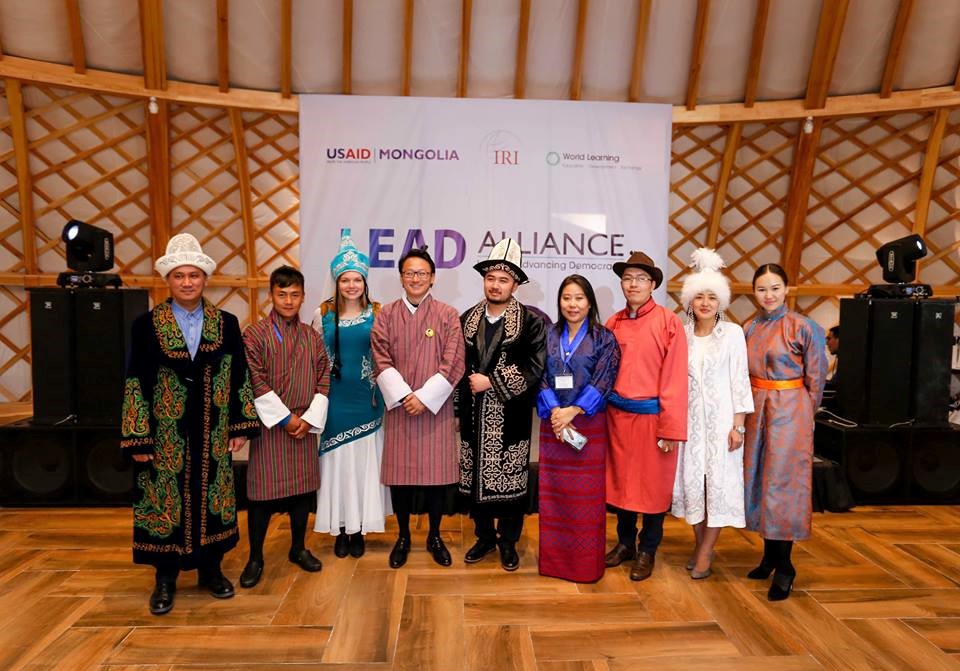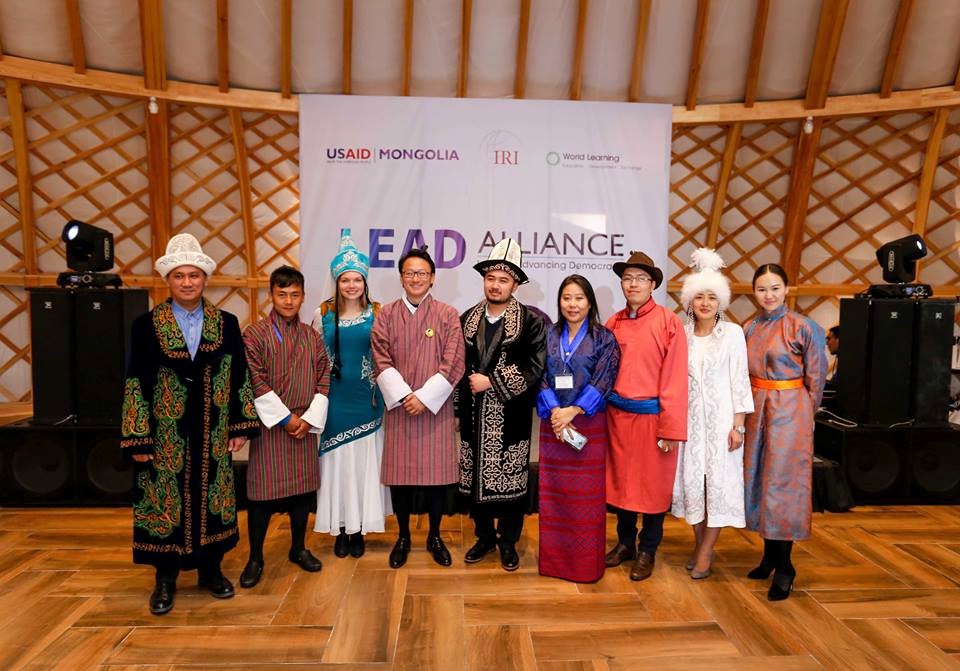
For the past three months, 45 young emerging leaders from Asia have been networking, sharing experiences, and collaborating on project ideas that would serve to address unemployment and poverty alleviation challenges that their countries face. In early May they flew from Burma, Bhutan and Kyrgyzstan to meet in Ulaanbaatar, Mongolia for a youth summit.
The LEAD Alliance, or the Leaders Advancing Democracy Alliance program, was designed as a two-year program to inspire 15 emerging leaders from Bhutan, Myanmar and Kyrgyzstan to make sustainable change within their communities by linking them with 30 young leaders from Mongolia who would mentor them as peer counterparts.
The LEAD Summit brought youth together from various backgrounds, armed them with knowledge and skills to influence change, and inspired them to think creatively, collaborate and mentor each other in their own personal (and country-specific) development. At the end of the summit, teams would pitch their themed project ideas and, if selected after judging, would receive small grants.
Among animated conversations, laughter and between panels, I was able to record unscripted interviews with a few participants from each country to find out the impact of the LEAD Alliance program.
Below is an unscripted account from one participant, Ilias Vadud, from Kyrgyzstan.
Interview:
What is your name?
My name is Ilias Vadud and I am a LEAD Alliance participant from Kyrgyzstan.
What inspired you to apply for IRI and World Learning’s LEAD Alliance?
I think one of the reasons I applied for the Alliance is because right now [Kyrgyzstan] needs leaders and we need some changes to be done in terms of [improving] the democracy that we have. I truly believe that in some ways [our democracy] went [in the] wrong direction these last couple of years and I think that this is the responsibility of our young generation [to set it in the right direction] because we are the future of our country. If we’re not going to care about it, then I don’t think anybody else will. I joined this program to learn something new … to meet new people who are working and struggling with similar issues in their countries and learn how they are [solving issues in their community], what instrument they are using, what method they are using, what projects or ideas they have, [so] that we can apply the same strategy in the Kyrgyz Republic.
Do you think that IRI has helped you acquire any new skills?
I think it [has already] been helpful… I mean we still [haven’t] finished the whole summit but even now I can say that it was really helpful. We met with some government officials of Mongolia who are telling us about the history of democracy in Mongolia and about the peaceful revolution in the early 90s … and that was really interesting and helpful information for us because we could see how this transition could happen in Mongolia and what was happening in Kyrgyzstan and we could compare those circumstances. Because they are really similar. We come from a similar background … both Kyrgyzstan and Mongolia.
Do you have any future plans to utilize this knowledge?
One of the main reasons I’ve joined it (LEAD Alliance) is because I am interested in [one of the themes at the LEAD Summit] which is the environment and urbanization and also of course the poverty and unemployment issue. Because I believe those things [are] sort of connected and they can help each other, especially in Kyrgyzstan. Especially now in the 21st century when the environmental issues are one of the biggest problems we have around the world. So back in Kyrgyzstan I am working with volunteers, with the youth, to teach them and make them understand the importance of the environment … the responsibility of civil society [to protect] our environment.
What specific resources would you like to see us provide to help strengthen the LEAD Alliance network?
I’m really fascinated about the whole project and the whole idea that is being used here in Mongolia and I really wish that we would have some similar initiatives like [this] in the Kyrgyz republic. Of course I don’t know if it will be possible in the near future, but I think this is a really good initiative, and I think that … if we could … conduct some sort of event like [this][in] Kyrgyzstan… that would be helpful. The reason I say [this] is because right now it is very important for the youth of our country to have the right guidance in terms of how they should develop themselves, where they should be looking and how they should educate themselves. This is very important because right now we do have a lot of … I would say … wrong kind of leadership in our country. Misleading the youth. Especially with the whole situation with the radical Islamism in the south of our country. They’re trying to affect the youth in many different ways. And the youth are always vulnerable… especially if they come from … [specific] social groups like low income groups and ethnic minorities. So, I think that would be a really great initiative for Kyrgyzstan to participate in and to get as much young people involved as possible and maybe to build some sort of a team that would work with Mongolia … and other countries … just all together… Like another LEAD Alliance….
That’s an interesting idea. As the Mongolians are mentoring you in this LEAD Alliance, would you serve as a mentor for youth in your own country?
Of course. I think that would be the responsibility that we should be taking… since we are taking part in this initiative and I think with being mentored now … and our Mongolian colleagues are sharing the knowledge they’ve acquired… from their trainings… this is really fascinating…. we didn’t have access to [this information] before… but now we have access to all these [collective] experiences and possibilities and new perspectives… so definitely it would be my responsibility to share it with the youth back in my country.
In what ways do you think involvement of marginalized groups can enhance public participation in decision making?
Well I think it is very important to promote open-mindedness in our society, especially in Kyrgyzstan because some parts of our society are really conservative and they really do not accept some of the minorities that should have been accepted. I think it’s very important to have [marginalized groups] involved because … they can show their… abilities… and the effectiveness of our joint work [to address the issues in Kyrgyzstan] … and I think this is very important for other people to understand that we are all in this together and we should be unified … and we should be working on the real issues that we have in our country. Not on some other problems that are being made up … you know, maybe some stereotypes or anything else… so yes I think that is something that we really need to look into.
